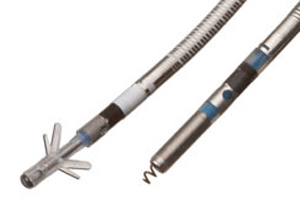
Medtronic (NYSE:MDT) fired back against accusations that it’s running a whisper campaign against arch-rival St. Jude Medical (NYSE:STJ), saying its own review of an FDA database supports the controversial findings of a study tying St. Jude’s recalled Riata defibrillator leads with deaths from internal short circuits.
Late last week, St. Paul-based St. Jude called for the retraction of the study, published by noted cardiologist Dr. Robert Hauser, finding a high rate of deaths related to the Riata leads after a review of medical device adverse event reports in the federal watchdog agency’s MAUDE database. St. Jude continued the offensive over the weekend, with CEO Daniel Starks accusing its peers of smearing its name to gain an edge in the slumping cardiac rhythm management arena.
"This is not a new accusation. From the very beginning of this Riata issue, St. Jude has been making claims that this is nothing more than a marketing campaign by Medtronic," spokesman Chris Garland told MassDevice.com in an email. "Medtronic has reviewed the MAUDE filings, applying the search criteria that Dr. Hauser used in his paper. Our results are roughly in line with Dr. Hauser’s results."
St. Jude claims that Hauser’s study included "inaccurate facts and biased analysis."
"Dr. Robert Hauser’s manuscript reported 62 deaths associated with another lead manufactured by Medtronic when, in fact, the actual number was 377 deaths – more than 6 times the amount published by Dr. Hauser. His resulting analysis, therefore, was invalid. We are seeking retraction and removal of the article from Heart Rhythm and will be making our research available to the Heart Rhythm Society for independent verification," the company told MassDevice.com today via email. "From the beginning, we have been interested only in ensuring that patients and the physician community have all of the correct facts surrounding our Riata silicone-only cardiac lead line. Our intent in correcting the manuscript and in calling for a retraction is simply that our research indicates that the data in the published manuscript is in error."
"St. Jude Medical was not consulted prior to the publication, nor asked to validate any of the data," the company said last week. "Since the manuscript was published, the company has spent more than 300 hours attempting to reach the same conclusions as Dr. Hauser, but can find no way of analyzing the MAUDE database that reproduces the same numbers reported in the manuscript."
St. Jude has kicked up the volume on its public statements about the Riata recall since last month’s release of the Hauser study finding that the Riata devices failed more frequently than previously reported. The device maker demanded a retraction of the study, which culled 133 lead-related deaths from the FDA’s MAUDE database and linked 22 to problems with the Riata leads. Medtronic’s Quattro Secure leads, which rely on a different insulation material, were associated with 5 deaths, according to Hauser.
"This has become a topic of competitive marketing," Starks told the New York Times over the weekend. "We have competitors going to physicians and informing them, either incompletely or mistakenly, of a competitively hostile view of the facts."
Starks and other executives also accused its Twin Cities foe of spreading rumors and breeding doubt about St. Jude’s Durata leads, according to the Times. The Durata leads use a different coating material than the Riata line and have not been associated with the same insulation issues.
"Numerous other institutions have issued case studies and manuscripts on this issue," Medtronic’s Garland told us. "This is very clearly not a marketing campaign; this is a serious issue with a device in the marketplace."
He went on to defend the Quattro lead, calling it "the industry’s and the world’s most reliable defibrillation lead, showing 97 percent lead survivability at 8 years post implant."
St. Jude stopped selling the Riata leads in December 2010, after revealing a 0.47% rate of "insulation abrasion" after 9 years of use. The issue, which occurs when the lead wires poke through their insulation, can cause an interruption in the cables’ ability to sense rhythm problems in the heart and could prevent needed shock therapy or even cause unwanted shocks to a patient’s heart.
The company issued a recall in December 2011 after 2 patients died and another suffered a serious injury when surgeons attempted to extract the leads. St. Jude last week preemptively recalled its QuickSite and QuickFlex left-ventricular leads for insulation issues similar to those found with Riata but which had yet to result in any injuries or deaths.
STJ shares sagged on Wall Street today, dropping 4.8% to $38.99 as of about 1:30 p.m. MDT shares were down 0.7% to $37.93.

